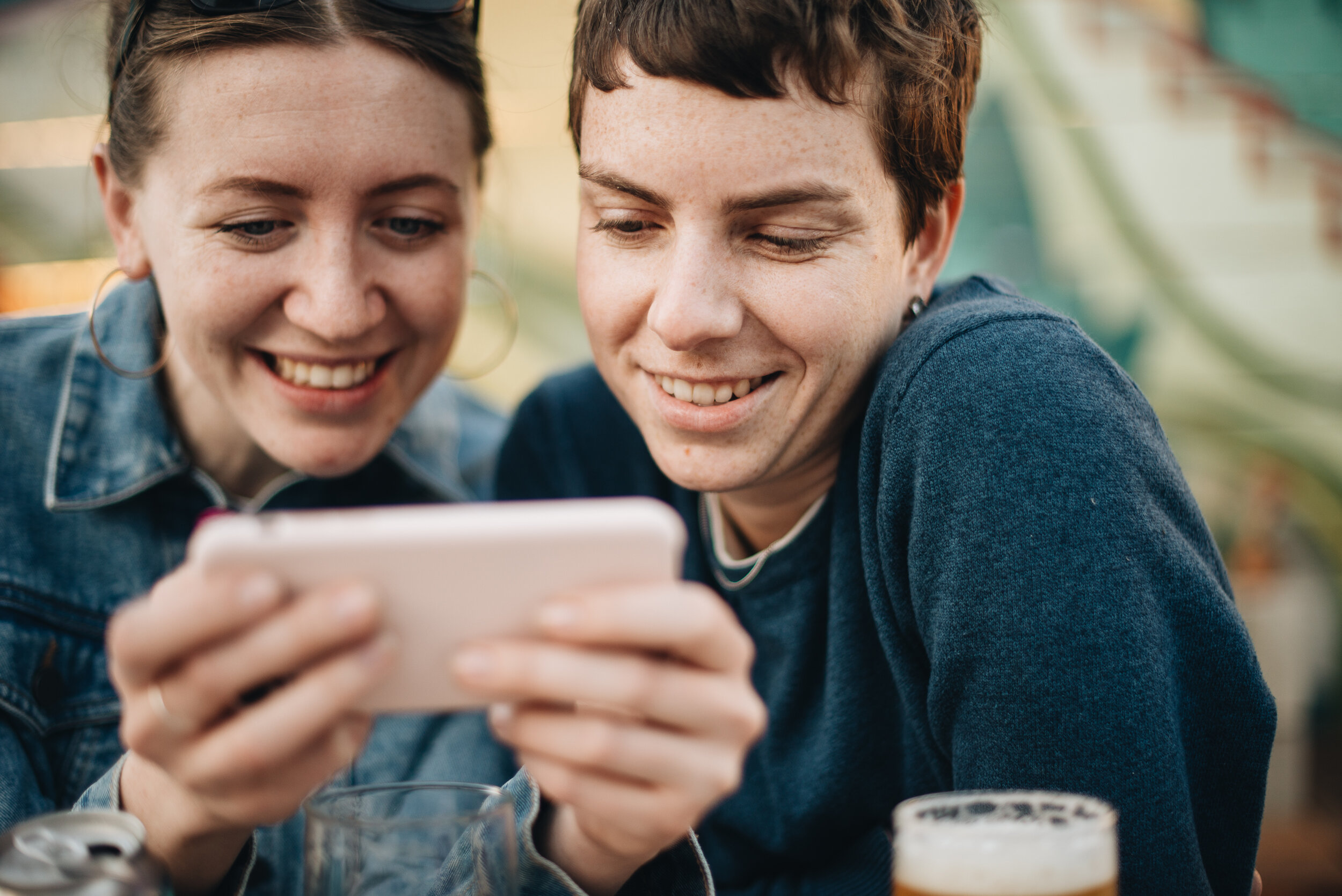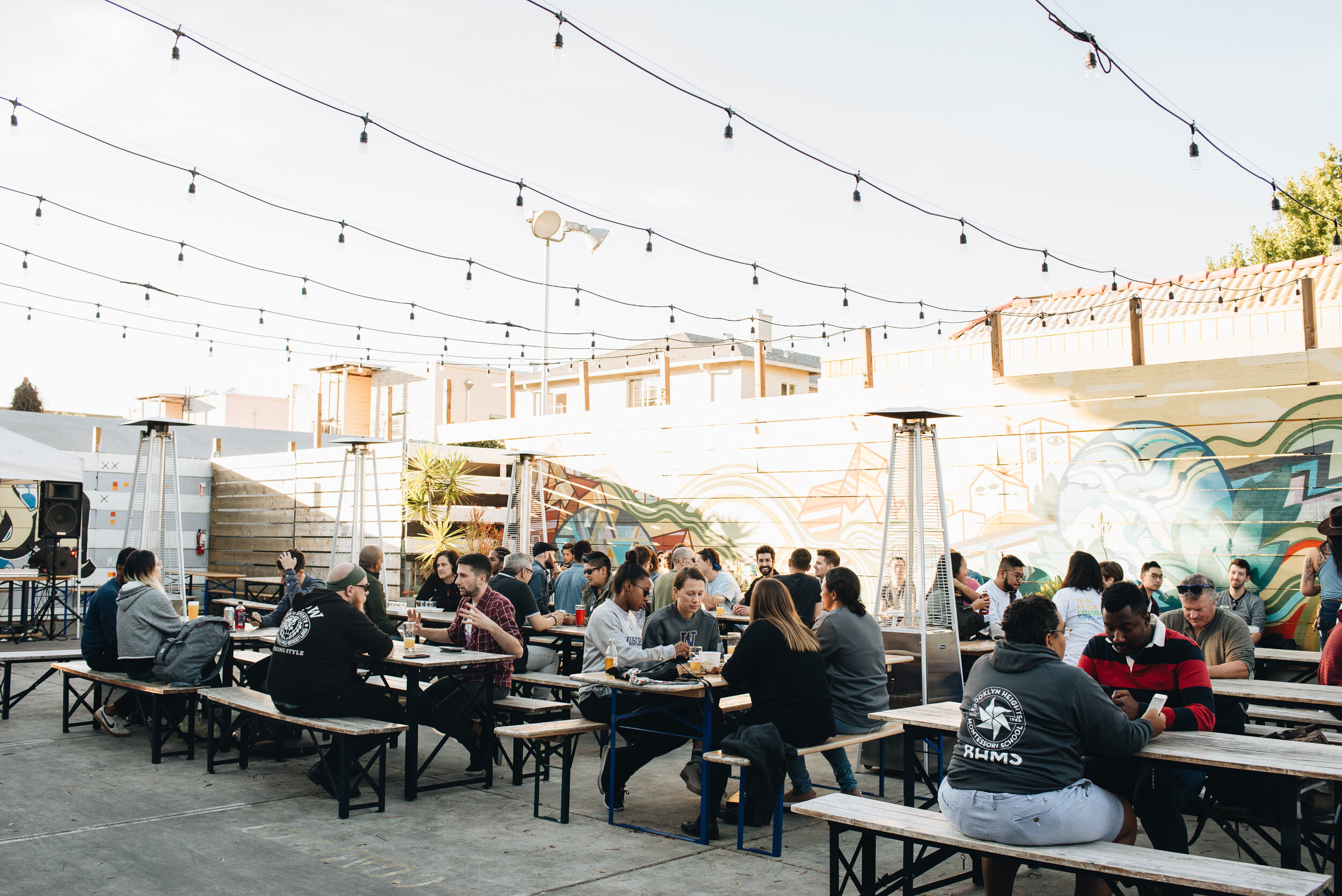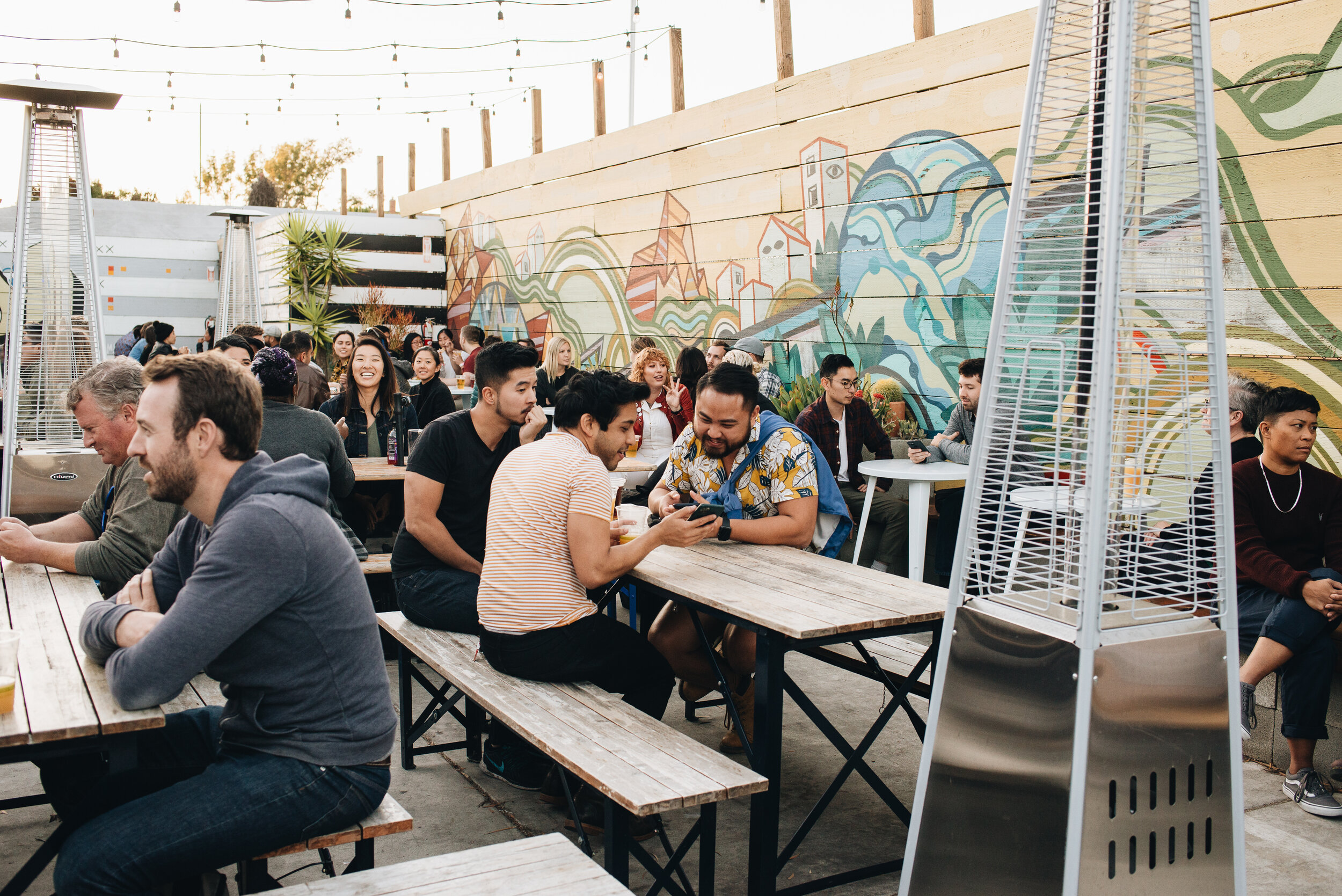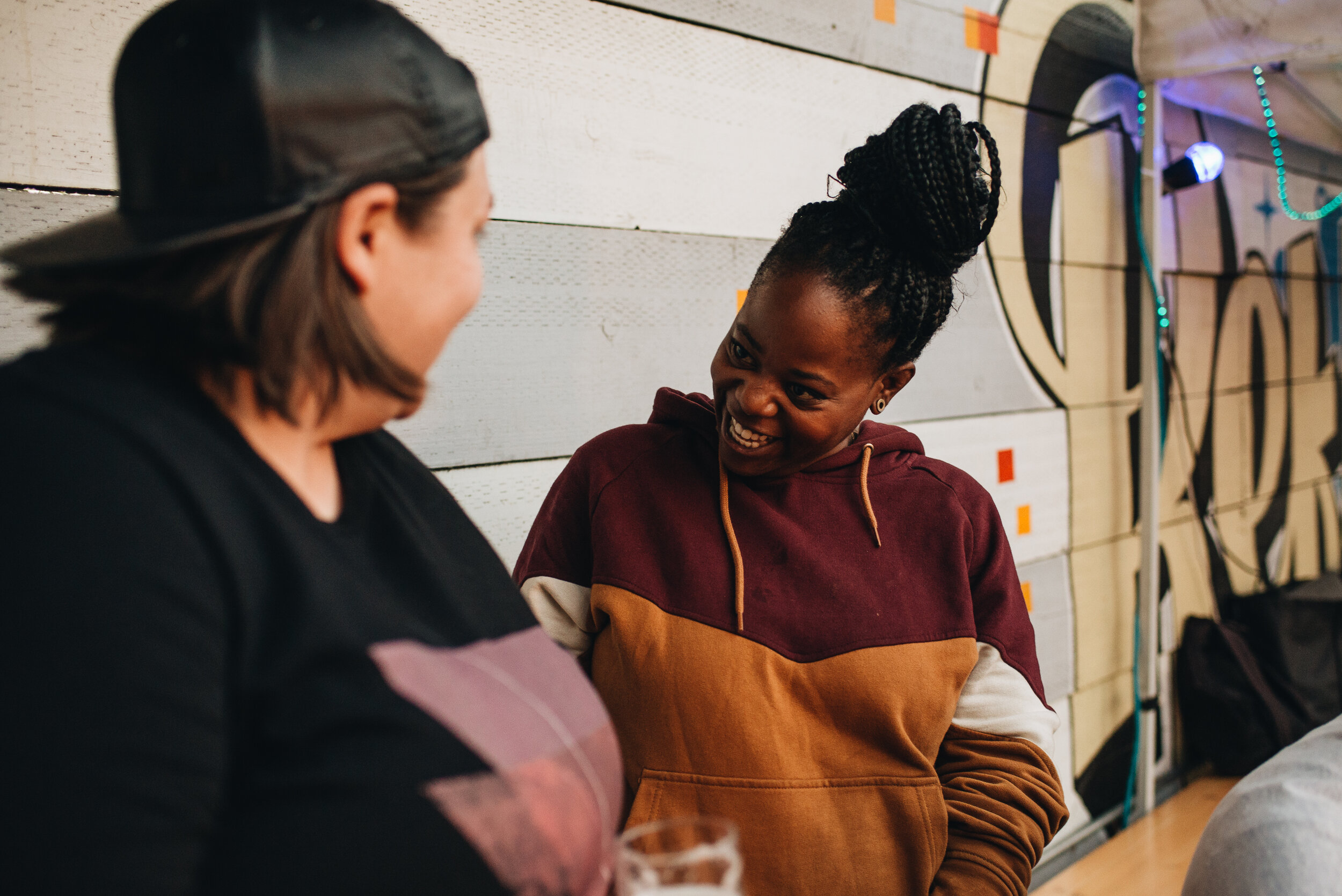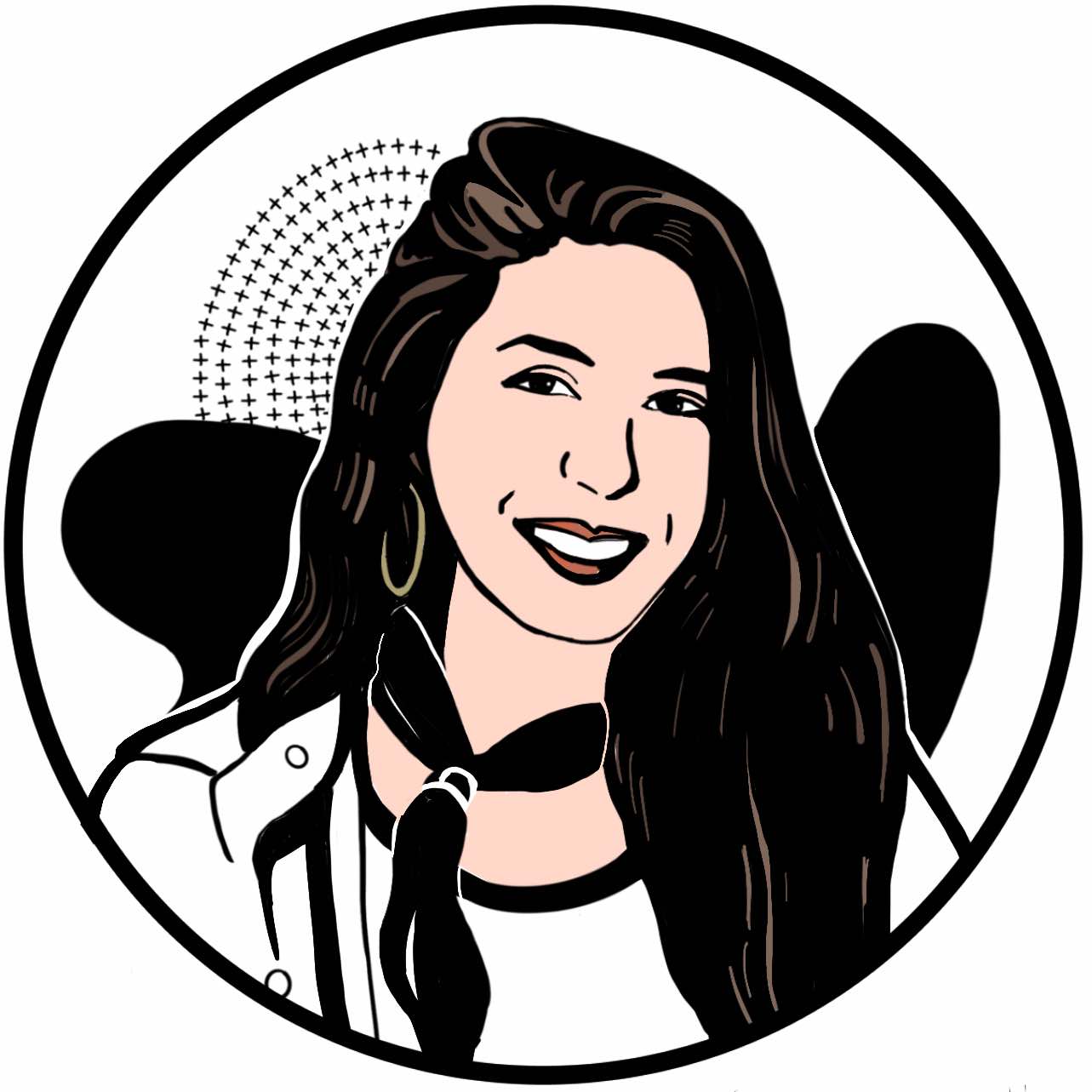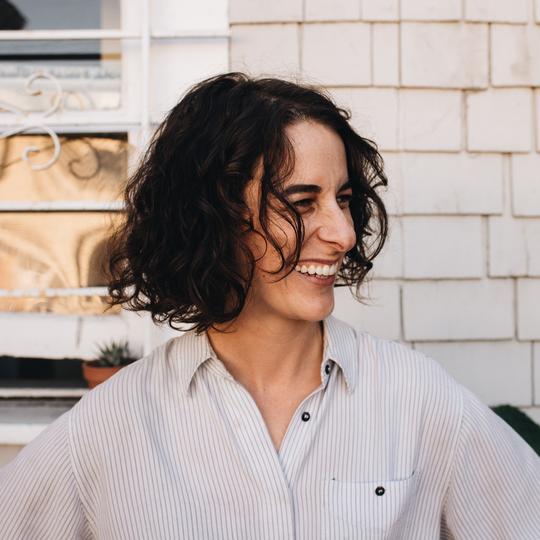“Was that the one where folks were trying to climb the fence to get in?”
When Nico Simonian—one of my former co-workers, and the beer education ambassador at Temescal Brewing—asks, I reply truthfully: I don’t remember. Every Queer First Fridays I worked at the Oakland brewery was eventful, wild, nearly out-of-control. My memory has compressed the monthly series into a singular chorus of laughter and music, of people making friends, connecting with neighbors, and overcoming their shyness to dance with new acquaintances. I couldn’t parse them if I tried.
Temescal sits right on the main drag of the neighborhood it’s named after, and as you walk down Telegraph Avenue, you can peer into the brewery’s windows and catch a flash of neon or pink. The building that it resides in, between a church and a Church’s Chicken, used to be an old movie theater. A big screen occupied what is now the taproom’s back wall, and the space’s floors were once gently sloped. As you walked towards the back, where the kegs and walk-in fridge are now, you had to bend your knees, anticipating the descent.
It’s August, early evening, and commuters are shuffling off the nearby BART station, removing their jackets as they transition from San Francisco’s cool weather to Oakland’s perceptibly warmer temperatures. Right now it’s calm at the brewery, but the scene is set for a busy night. Picnic tables have been arranged around the patio to accommodate a large dance area. The bartenders stand on tranquil high alert, ready for the moment when the party tips irrevocably from a few stragglers at the bar to a teeming room full of people, waiting for their beers.
That point is hard to predict. It happens in an instant. On a warm night like this, where the sun leaves long shadows trailing behind the few remaining pint glasses—they’ll soon be swapped out for plastic—the line appears within minutes, and grows until it wraps all the way around the building. It’s as if everyone got home, threw their briefcases on the floor, and ran to the brewery all at once.
I haven’t been back to Oakland since I left in 2017, and I planned my return to line up with Queer First Fridays, which coincides with First Fridays: a monthly festival held across Oakland celebrating artists, local food purveyors, and, at Temescal, a unique queer scene.
I’m not queer. I joined the staff at Temescal during the summer of 2017 when, after a rough breakup, I needed the comfort of my bar friends to distract me. At the time, they were used to seeing me hop into the taproom and ask one of the bartenders for help on 21 down on the New York Times crossword, or grab a pint in between loads of laundry. But I was on staff when then-bar-manager Theresa Bale planned the very first Queer First Fridays. Back then, no one could have known how much the event would grow, and all that it would come to signify. It wasn’t planned that way, but it became the dance party the community needed.
“Queer First Fridays started out as my birthday party,” says Theresa Bale, now Temescal’s head of operations and events. “I had been low-key DJing for a few years at home and had always dreamed of throwing my own queer party suited to what I liked. I usually don't vibe too much with all the usual queer parties that are aimed towards nightlife and gay boys. ”
Bale hints at what queer events in the Bay Area were like at the time: held at clubs, late at night, and certainly not centered around craft beer. “I like to be in bed by midnight, not go out at midnight. I like hanging out and dancing outside during the daylight, not in a dark club at night,” Bale jokes.
If parties at the time were homogenous, they were also starting to disappear, particularly as gay bars across San Francisco—and the country at large—began closing en masse. Speaking to Eater in 2018, Zach Stafford, former editor-in-chief of Grindr’s INTO magazine and co-host of Buzzfeed’s AM2DM podcast, said that dating apps have reduced the need to go to bars to meet new people—and in general, society has become more accepting of queer lifestyles, meaning more of queer life is lived out in general society as opposed to being shut away in particular bars and neighborhoods. At the same time, new spaces that tend to be more inclusive have begun to emerge, and work to invite those who have often been left out of more segregated venues, in particular trans and non-binary folks, and people of color.
“The bar was packed. Sam [Gilbert, owner of Temescal] had to bus glassware for hours. It ended up being the busiest and most lucrative night we had ever had.”
QFF is a response to these factors, though it started out small. The very first one, in June 2017, was planned as a low-key way for Bale to gather her friends and enjoy great beer while still being a deliberate gathering place for the queer community. “I pictured me and about 20 of my closest friends drinking [Temescal’s] beer, DJing, dancing and enjoying a nice summer night,” Bale says. “Except it was lit. The first party drew in crowds and crowds of over 500 people. We had a line out the door for hours. The bar was packed. Sam [Gilbert, owner of Temescal] had to bus glassware for hours. It ended up being the busiest and most lucrative night we had ever had.”
At the time, First Fridays were slow for Temescal, which had only been open a couple of months. Although the event is technically hosted in Downtown Oakland, other parts of the city still choose to take part, blocking off a few streets in a given neighborhood for residents to set up tables and sell food and crafts. Businesses can usually depend on a bump in foot traffic on First Fridays, with all demographics—from families wandering with children to 20-somethings getting ready for a night out—represented. But those crowds just weren't hitting Temescal until QFF came along.
After the first event, Bale reflected on the successful, albeit chaotic, night. “An entire Oakland brewery was filled with the most amazing queer folks drinking beer. Additionally, it specifically struck a chord with queer women and queer people of color. My heart was so full.”
When Bale talks about the glassware, a flash of the night comes back to me. I remember seeing Sam running around the patio, picking up empty pint glasses and us bartenders having to wait for clean glassware before we could serve the next batch of bar patrons. We all immediately knew two things: one, we needed more glasses, and two, we had to keep doing this.
“After chatting with Sam about it,” Bale says, “it became clear: Queer First Fridays was here to stay.”
QFF is now celebrated every first Friday of the month, rain or shine. The night usually starts around 5 or 6 p.m., with the first DJs taking the stage, ready to play for their early-evening audience: kids. “Usually my friend and resident Queer First Fridays DJ Miller, who does our opening set very regularly … she has a bunch of kids out there on the dance floor dancing,” says Bale.
The audience for the event is diverse, and it evolves throughout the evening. “The night just transforms,” says Bale, “and it just happens so naturally and so organically. [The] beginning is families, and then it slowly starts transitioning into folks that just got off of work, into people that this is their starting point for the night. This is the pre-party.”
Freddie Seipoldt has been coming to QFF since day one. “I found out about Queer First Fridays through a friend-slash-coworker a little over a year ago. I've returned every month pretty much ever since, so that should give you an idea of how drawn I was to the space.”
Part of what attracted Seipoldt was the venue, with its spacious patio and ideal beer-drinking setting. What kept them coming back, however, were the people in the crowd. “A lot of the spaces I'd frequented in the past were admittedly not as heterogeneous and never really quite struck the right chord when it came to setting a warm, friendly environment,” they say. “At Queer First Fridays, I really feel like I can go up and talk to anyone. It's become an occasion for me to invite all of the queer family in my life out for a night of fun and respite from the stressful weeks we've had. The space sort of became my home base. Somewhere I could go to and not feel judged. And in a world where we're constantly forced to perform, I think a space like this is rare and something we all deserve.”
“The space sort of became my home base. Somewhere I could go to and not feel judged. And in a world where we’re constantly forced to perform, I think a space like this is rare and something we all deserve.”
Each event is slightly different, but generally is structured around DJ sets and live performances. Most are headed up by resident host Jocquese Whitfield, known as Sir JoQ. As the host of QFF, Whitfield is in charge of keeping the party going. “You set the tone for the party,” he says. “It takes a lot of energy.” He’s often seen just in front of the DJ stand, encouraging attendees to get on their feet and dance.
Like Seipoldt, Whitfield notices that the people on the dance floor aren’t a monolith, or limited to any specific subsect of the queer community. “It’s inclusion on every level,” he says. Although many heed his calls to dance and cheer on performers, others are just as likely to sit quietly in the corner, enjoying the scene from a distance—and they’re still part of the larger picture.
Another essential group are the performers. Although seasoned DJs come in, many folks have gotten their start at the event, including Seipoldt. “I was over-the-moon when I was asked to perform some of my original music for Queer First Fridays back in May, and again in June and October,” they say. “Each of those times that I performed were monumental for me because I was able to share myself more with a space so important to me, and the anxieties and pressure of perfectionism were easier for me to manage knowing that I was doing it for a loving and nurturing community.”
Like Seipoldt, Bale used QFF at a space to cultivate her newly found love of DJing. “More queer artists are performing regularly and all the people who started as anonymous faces across the dance floor are regulars and, dare I say, friends,” she says.
“It’s great to have fresh faces,” Whitfield says. “Most of these [other] parties have the same DJs. I can predict their DJ sets.”
Looking back, Kai Villegas, Temescal’s director of operations, isn’t surprised by the success of QFF.
“I've been in the beer industry in one form or another since 2010 and have always felt that there was a sense of inequality in the industry,” he says.
Perhaps unsurprisingly, Temescal is home to a number of queer beer professionals—in a way, that’s by design. “In 2014, I got the opportunity to build a bar team from scratch at Brewcade [now known as The Detour], where I originally hired Theresa, where I knew I wanted to be surrounded by more people ‘like me,’” he says. Villegas eventually received an opportunity to work at Temescal as employee number two, building both the taproom program and bar team, then the distribution and wholesale program, from scratch.
“Then I eventually got the opportunity to do the same at Temescal Brewing, where ‘like me’ became more open and meaningful, but this time I focused on team dynamics more than I had previously,” he says. “‘How well will we all work as one unit?’ That seemed to spark a quick feeling of support, respect, and family within the bar team that I think still holds true today.”
“In queer communities there is a lot of mention of being able to choose your family; and in a lot of ways, there were parallels there. Lots of friends and family (chosen and not), and friends and family of those friends, showed up that first night for Theresa’s birthday.”
QFF was never about one person. “Looking back, I think that supportive team feeling really helped build the initial momentum of the event,” Villegas says. “In queer communities there is a lot of mention of being able to choose your family; and in a lot of ways, there were parallels there. Lots of friends and family (chosen and not), and friends and family of those friends, showed up that first night for Theresa's birthday.”
This close team dynamic also explains why QFF was a hit from the get-go. It became an instant employee favorite—we clamored for those shifts because we all wanted to be part of something powerful, and homegrown. “Because of the supportive, family-like team that was developed behind the bar there was a lot of respect, acceptance, and love in the air that night with all of our guests, knowing that a lot were friends and family of Theresa and I,” says Villegas. “I think that theme still runs through the event today trying to create a fun, safe, and accepting space for 'family.'”
That feeling has extended beyond the event series. “After a couple of Queer First Fridays I noticed, ‘Oh, I'm seeing queer folks come in here on a normal Tuesday night or Wednesday night for date night and stuff,’” Bale says. “You want to see yourself represented in places that you go. And people were starting to see that. And sometimes it just takes one event. It just takes one thing to get people to come in, check us out, give us a chance.”
Temescal runs things differently from most other breweries. Upon entering the taproom, you’re greeted by bright pink walls, plywood accents, and, lest you miss the memo, a neon sign emblazoned with the brewery’s motto: “No Jerks.”
“Sometimes people stumble in, they think we're an ice cream parlor or a coffee shop,” Bale says. “So how do we get them to feel comfortable in a space that they're already uncomfortable, right? And that's where our kind of unique style of no-jerks customer service steps in.”
One of the first things you notice when you walk into Temescal is that someone always greets you. If you don’t know what you want from the menu, the taproom staff are helpful in a way that makes you feel like you’re not silly or dumb for asking questions. “We're not going to make you feel like you don't know what you're talking about or make you feel like you shouldn't be there because you don't understand a style or what something is, you know?”
This is key because—besides a few sparkling waters and kids’ drinks (chocolate milk is a popular order on a Saturday afternoon)—Temescal only serves beer. No wine, no liquor. Finding ways to connect customers with what’s on tap then becomes critical. “So many people in the queer community just don't feel safe and comfortable even exploring beer,” Bale says. “It's not marketed towards you. And so it was like, we are going to bring you into our space. We are going to intentionally create an event for the queer community and with the queer community and open up your eyes to that and see what we have to offer.”
Broadly speaking, Temescal’s beers do feel approachable—many are decidedly fresh, crisp, and soft, and frequently skew towards lower ABVs. The beers on today’s menu feature upbeat names like Lawn Flamingo and Cat Nap; past releases, like Push Pop and Pool Noodle, evoke whimsy and nostalgia. Included in the can menu is Spooky Puppy, a NEIPA brewed for the taproom’s annual dog costume runway competition. Its label features drawings of last year’s winners, like Max, a husky dressed as the Wolf of Wall Street, or Bongo, a cute mutt in lobster getup. These releases are inviting by design—you should feel equal parts silly and tickled when you order one.
Today, Love is Love, a Hazy IPA brewed every year for Oakland Pride, is served in cans during the dance party, so attendees can grab a beer quickly. When Love is Love isn’t available, another special QFF beer, Queercation IPA, is often thrown into the mix.
Tonight’s event feels both electric and wonderfully ordinary. It isn't a typical brewery event—the bar isn’t filled with bearded men talking shop about beer—but there’s nothing that feels out of place, which is sort of the point. Folks excitedly hug one another and pick up conversations they left off at the last QFF. Some slowly gravitate to the dance floor, waiting for other, braver souls to jump in. Groups of friends are huddled together around picnic tables, telling stories about their day. As the sun begins to set, and people’s courage begins to rise, two worlds feel at play. There’s both nothing and everything special about this moment.
Ultimately, two principles make an event like QFF possible. One is that the work that goes into building an inclusive space requires intention, beyond simply making invites and hoping people show up.
Although she’s a queer woman, Bale also acknowledges that being white and cisgender means she needs to ask for help from others. “I’m very open about that. I can't create spaces for queer or nonbinary people of color because that's not me. I make sure to create these events with people from those communities. I can’t assume that I know what every community needs.”
Along with working with folks from a variety of different backgrounds, Bale and her QFF team always make a contribution to a charity during every event. “We’re here to have fun, but we’re also here to raise funds and build awareness in our community,” Whitfield says. In the past, QFF has donated to the Transgender Law Center, the Oakland LGBTQ Community Center, TurnOut, AIDS/LifeCycle, The Pacific Center for Human Growth, Dare to Strive, and other queer-centered non-profits.
“So many people in the queer community just don’t feel safe and comfortable even exploring beer. It’s not marketed towards you. And so it was like, we are going to bring you into our space. We are going to intentionally create an event for the queer community and with the queer community and open up your eyes to that and see what we have to offer.”
It helps that Temescal was designed to be a different kind of place, thanks to the foundational work people like Gilbert, Villegas, and Bale did in the beginning. “This was going to be a place for people that don't have a place in craft beer. And it's not just queer people; it's women, it's people of color. It was very much going to be a much lighter, bright space that’s very welcoming,” Bale says. Even with such strong signaling, Temescal is still a beer haven—it regularly sells out of can releases and, in a short time, has established itself as one of the best breweries in the Bay Area. “Being inclusive doesn't limit what you can do,” she says. “In fact, it expands it really greatly.”
Then there’s the second thing: being inclusive isn’t that hard. It requires setting values and asking for input from others not like you—but once you do it, things fall into place. Bale has been able to take QFF to other breweries, most notably Threes Brewing in Brooklyn, New York. “I met someone when I went out there one time and we connected and stayed in touch. Every year they brew a beer called Gender Neutral for Pride Month and they give a portion of proceeds to a local queer nonprofit. So this past June was our very first destination Queer First Fridays,” Bale says. She hopes that more breweries reach out and ask how they can collaborate on a similar event.
For as lively and exciting as QFF is, some of its greatest magic is found in the quiet moments. Bale looks for them, too. “You can sit at one of the back patio tables and just eat some food and hang out with your friends—or you can move towards the front and dance on the dance floor and get close to the DJ. All of it is here.”
“This isn’t a scene,” a bar patron says, meaning it as a compliment. It’s early, before the crowds have shown up, and they’ve timed it that way on purpose. They plan to dip out before 8 p.m., they tell me, but showing up and connecting with friends and grabbing a quick drink after work was a non-negotiable. “It’s not a place to Instagram. I don’t know most of these people—it’s not like the rest of the queer scene where it feels like I’m in a room where I fucked all my exes.”
They sip their beer, and settle contentedly into their seat as attendees start to fill out the other picnic tables. They’ve already closed their tab.





